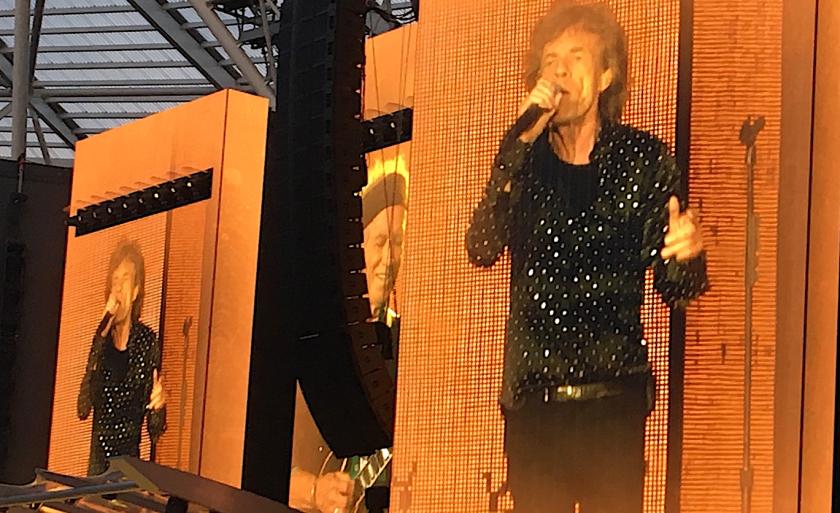As the veteran combo roll around one more time, five years after they last performed in the UK, many a ticket-buyer for their No Filter tour has taken the view that, as the Stones once sang, this could be the last time. They didn’t play that one, perhaps not wishing to give fate the opportunity for a free hit, but they did take us on a trip through a decent chunk of their best-loved songs, and made room for a few surprises.
While the likes of “Start Me Up” and “Satisfaction” sounded strangely messy and unfocused, some of the less obvious choices paid major dividends. For instance “Under My Thumb” was galvanised by the addition of a pumping Motown beat. The lilting “Fool to Cry” was sweet and soulful, sung by the often facetious Mick Jagger with touching sincerity. “Ride ‘em on Down”, from the recent-ish Blue & Lonesome album, was a chunk of raw bluesy swagger, the band playing it tough and sinewy while Jagger’s vocal peeled away the decades and flashed us back to their formative days at the Marquee or the Crawdaddy Club. “We used to play blues not far from here at Dalston Baths,” Jagger remarked, seeming to relish being back on the London turf that first nurtured them. He couldn’t resist a crack about Harry’s wedding. “We had a street party on Saturday. Charlie was on the tea urn and Ronnie sang some of his gypsy songs… We were going to get Bono and the American bishop to say a few words, but we decided not to.”
He couldn’t resist a crack about Harry’s wedding. “We had a street party on Saturday. Charlie was on the tea urn and Ronnie sang some of his gypsy songs… We were going to get Bono and the American bishop to say a few words, but we decided not to.”
Jagger remains an age-defying marvel, at 74 still lithe as a whippet and shimmering like a snake charmer, sprinting up and down a long gangway out into the crowd energetically enough to shame singers a third of his age. He certainly put support act Liam Gallagher in the shade, since Liam does little except stomp menacingly around his microphone stand as though looking for something to kick, perhaps a football or somebody’s head. We’ll give him a break though, because at least he sang Oasis’s definitive anthem “Rock’n’Roll Star”, and dedicated “Live Forever” to Manchester.
For better or worse, richer or poorer, there’s no Mick without Keith Richards (pictured above and below), though these days Keith prefers to take it a little easier. He has boiled his performance down to that of benign old godfather, watching the antics of his band with a tolerant eye while he lazily chops out some distinctively Keef-ish chords – the intro to a gloriously blowsy “Tumbling Dice” for example, or the eerie filigree pattern of “Gimme Shelter” (accompanied here by giant screen images of leaping flames and Grosvenor Square riots). His Chuck Berry-esque licks added a distinctive tang to “It’s Only Rock’n’Roll”, and he added some bluesy twists to his rough-hewn solo performance on “Slipping Away”.
 The Stones don’t really have a lead guitarist, but it was Ronnie Wood who played most of the solo parts, sometimes joining Jagger for a theatrical scamper down the gangplank while he tormented his fretboard. The Stones sound emerged at its most authentic, though, when the two guitarists meshed together, as in a powerful “Street Fighting Man”, “Honky Tonk Women” or “Paint It Black”, Wood adding a quasi-sitar tone to the latter.
The Stones don’t really have a lead guitarist, but it was Ronnie Wood who played most of the solo parts, sometimes joining Jagger for a theatrical scamper down the gangplank while he tormented his fretboard. The Stones sound emerged at its most authentic, though, when the two guitarists meshed together, as in a powerful “Street Fighting Man”, “Honky Tonk Women” or “Paint It Black”, Wood adding a quasi-sitar tone to the latter.
Of course, they had help from their elite squad of backing musicians. Chuck Leavell unleashed some show-stopping interludes of honky-tonk piano (not least on “Honky Tonk Women”), bassist Darryl Jones was given space to show off some fancy funk finger-work in “Miss You”, and mega-soulful vocalist Sasha Allen had a full-on duet with Jagger in ”Gimme Shelter”. Yet fine as all this was, it was drummer Charlie Watts who bolted the whole lot together with his unswervingly rock-solid beat. It’s amazing how this fragile, white-haired figure delivers so much concentrated wallop with apparently so little effort, but the essence of the band depends on him as much as anybody. To say we’ll never see their like again is a dog-eared old cliché, but that doesn’t mean it isn’t true.














Add comment